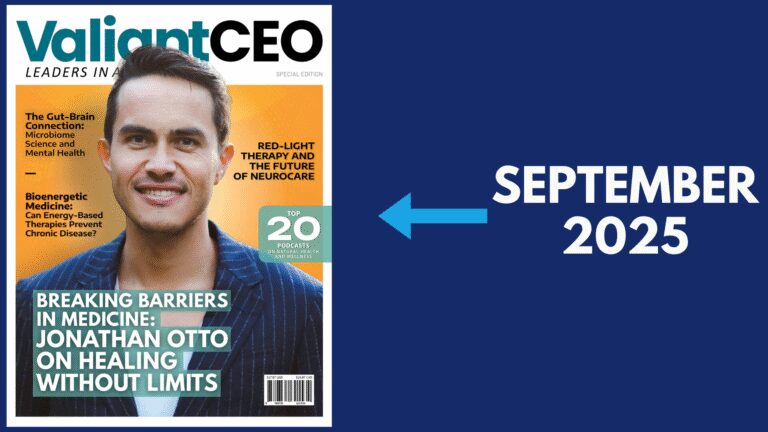Ryan Kuhlenbeck is the CEO and co-founder of Pico MES. His career spans a wide range of automotive manufacturing including General Motors, Tesla, and Alta Motors. He has experienced firsthand the real-world issues that the digital divide creates and has created a company that is dedicated to helping factories of all sizes be more efficient and profitable. He is a graduate of Missouri Science & Technology and now resides in a small factory town.
Company: Pico MES
We are thrilled to have you join us today, welcome to ValiantCEO Magazine’s exclusive interview! Let’s start off with a little introduction. Tell our readers a bit about yourself and your company
Ryan Kuhlenbeck: Manufacturing is in my blood. Growing up in Central Illinois, I saw first-hand the impact local factories had on a community – like sponsoring little leagues, or making sure the local cafes had a steady stream of patrons. This cemented my passion for the industry which anchors the work I do today.
I started my professional career at General Motors 20 years ago, working on product launch teams as an engineer for high performance vehicle operations before transitioning to Tesla to help establish its California factory for the Model S launch. One lesson I learned: whether you’re GM or Tesla, you’re only as strong as your suppliers and they are the ones who need help.
These suppliers are the backbone of American manufacturing, producing the vital components that keep the industry moving. Remarkably, a vast majority of factories in the U.S. employ fewer than 500 people and contribute to over half of the nation’s manufacturing output. Yet, despite their significant role in the industry, many continue to use traditional methods, such as pen and paper, to manage their operations.
This starkly contrasts with large enterprises like GM, who have the resources and tech to run operations digitally. That’s why I founded Pico MES to empower factories of all sizes with the tech to connect the shop floor on a common platform and error-proof assembly operations.
If you were in an elevator with Warren Buffett, how would you describe your company, your services or products? What makes your company different from others? What is your company’s biggest strength?
Ryan Kuhlenbeck: The U.S. manufacturing industry faces a significant digital divide between enterprise giants and its smaller manufacturing counterparts. The automated and digital ecosystems used by enterprises is not the norm. In fact, most manufacturers still heavily rely on manual operations, making them vulnerable to costly errors and delays.
At Pico MES, we’re dedicated to bridging this gap by making it easier for all manufacturers to digitize their operations and eliminate errors, thereby boosting their productivity. Historically, when a manufacturer has decided to onboard factory floor technology, they’ve had to choose from solutions designed for large enterprises. These solutions, while effective, come with hefty price tags and significant upfront costs – a high deterrent for any business, especially for those without ample resources.
When bringing Pico MES to life, I wanted to make it as easy as possible for manufacturers of any scale to deploy and boost their production by error-proofing the factory floor. The goal is to help them transition from traditional operations so factory workers and manufacturers can have a greater breadth and depth of understanding of their assembly line operations, digitally tracking every nut, bolt, and part. If something goes wrong, they can refer to data collected and pinpoint where the error occurred or eliminate the cause all together.
But in order for that to happen, manufacturers have to be willing to deploy a costly service. To make it more accessible, we recently announced a no-cost model to allow any manufacturer to use Pico’s platform –with no time limit– and see the impact for themselves. Cost will no longer be a barrier for factories interested in digital transformation – we are helping them take the first step in this journey.
Quiet quitting, The Great Resignation, is an ongoing trend causing many businesses to struggle to keep talent engaged and motivated. Most are leaving because of their boss or their company culture. 82% of people feel unheard, undervalued, and misunderstood in the workplace. In your experience, what keeps employees happy? And how are you adapting to the current shift we see?
Ryan Kuhlenbeck: At Pico MES, we really take pride in our remote work culture and think it’s one of the biggest attraction points to our employees. The pandemic really debunked the misconception that employees will not be productive at home. With so many companies trying to return to office causing further dissatisfaction, we found that doubling down on remote work is the key to keeping our employees happy.
In addition to our remote work culture, we provide $3,000 every two years from an employee’s first day to cover computer and other work/office essentials to make their home office as effective as possible. Adding to that, we package in unlimited PTO, great healthcare, and a 401K. We also offer wellness perks to support our employees that include online mental health therapy, virtual health and fertility care.
Online business keeps on surging higher than ever, B2B, B2C, online shopping, virtual meetings, remote work, Zoom medical consultations, what are your expectations for the year to come and how are you capitalizing on the tidal wave?
Ryan Kuhlenbeck: Choosing to replace w/ the following question:
In the past year, what is the greatest business achievement you’d like to celebrate with your team? Please share the details of that success.
The greatest achievement is seeing the impact we are having on our automotive original equipment manufacturers (OEM) using Pico MES, helping them achieve error free production and boost opportunity with automakers.
In Marion, MI, we helped Pollington Machine Tool (PMT), a family-owned, automotive OEM, pass safe launch in two weeks and qualify as a tier 1 EV parts supplier for a leading auto company. Pico MES helped digitally connect 18 of their workstations and upload 100 processes previously organized in binders.
In order to pass they had to assemble 4,000 EV rail assemblies with zero defects. If an error occurred, the counter had to be reset to zero. PMT used our platform to digitize the detailed assembly workflows, helping train new workers and ensuring production remained consistent to keep the counter from resetting. In the end, PMT was able to manufacture 4,000 assemblies for EV side rails with no defects and pass safe launch.
In Louisville, KY, we helped HJI Supply Chain Solutions (HJI), a black and woman-owned auto parts manufacturer eliminate errors, upskill workers and increase production to expand a contract with a top 10 global automaker.
Like PMT, HJI leveraged our platform to uphold production quality and the worker experience by digitizing instructions. Having every step outlined helped train new workers quickly, while eliminating the error of missing a step in the assembly line. Ultimately, HJI shipped 1,685 units, all error-free in nine months.
Overall, we are seeing great results with our manufacturer users. These use cases can serve as a blueprint for other factories of any size across the country to accomplish their production goals, overcome industry issues, like labor shortages, and support their local economies.
Business is all about overcoming obstacles and creating opportunities for growth. What do you see as THE real challenge right now?
Ryan Kuhlenbeck: The biggest challenge in the industry is the digital divide between the technology large enterprise manufacturers use every day and the traditional processes the rest of the industry still relies on.
So what do large enterprise manufacturers have exactly? They have the use of modern infrastructure tools & error proofing strategies. Used together, they have seen significant gains in productivity and profitability. These gains are what enable companies to be successful in the global economy, and without them, our manufacturing base, all the other sized factories struggle.
In complex manufacturing verticals, such as automotive and aerospace, the supply base is limiting what can be reshored into existing factories which is a key strategic need for the resiliency of those OEMs. If we can create products that fit the needs and budgets of non-enterprise scale factories, both our local communities supported by those factories, as well as the OEMs themselves directly benefit.
Some of this will be overcome by new products coming onto the market, but the OEMs may also need to change their requirements, and their budgets, to ensure investment occurs at the pace required. If we achieve this, US manufacturing can return to the leadership role it enjoyed in the last century, and I truly believe this can and will occur rapidly.
In your experience, what tends to be the most underestimated part of running a company? Can you share an example?
Ryan Kuhlenbeck: By far the most underestimated part of running a company is the mental capacity needed everyday to solve various open items, tasks, and strategies. It is a 24/7 job. Even while you’re sleeping you’ll still be thinking about how to resolve the last issue that came up, or strategizing how to address the next growth phase of the company.
I think many, including myself, underestimate the endurance needed to continue growing. It’s a daunting feeling to know what would happen next when the money stops with you.
On a lighter note, if you had the ability to pick any business superpower, what would it be and how would you put it into practice?
Ryan Kuhlenbeck: Choosing to replace this question w/ the following:
2020-2023 threw a lot of curve balls into businesses on a global scale. Based on the experience gleaned in the past years, how can businesses thrive in 2024? What lessons have you learned and what advice would you share?
I think the pandemic and following recovery has set a new precedent for companies to plan, in detail, the various scenarios that could cause significant disruption to their businesses. We saw how some companies immediately shifted to remote work at the onset of lockdowns while others struggled to adapt quickly, scrambling to complete simple tasks like deploying laptops instead of desktops.
For manufacturers, the disruption was felt the most in the supply chain. Between material shortages and inventory buildups, many manufacturers were experiencing significant downtime as they were trying to mitigate losses and costs. As we move forward, my vision is to ensure we continue business during disruptions by understanding which manufactured components are critical and which can take the burden of some risk.
What does “success” in 2024 mean to you? It could be on a personal or business level, please share your vision
Ryan Kuhlenbeck: Success to me in 2024 is empowering manufacturing businesses to navigate the uncertainties they face on their own.
We’ve been on the edge of a recession for a couple of years and the federal government has been helping us weather that well. However regardless of the US election’s outcome this year, there will be some amount of policy changes that will impact manufacturing.
We as leaders must anticipate what could happen and plan for how it impacts our business, and our customers. Not only do we have to plan for different scenarios, but also share effective strategies with our teams that allow them to trust each other enough to stay focused on the task at hand.






